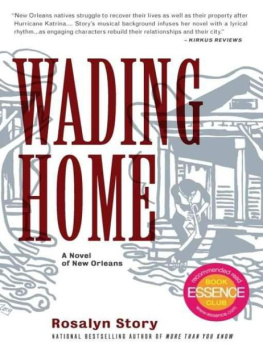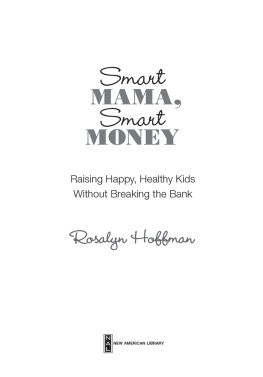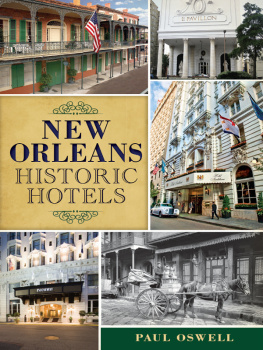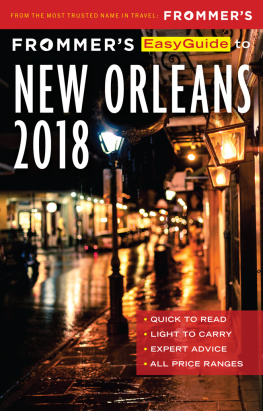Rosalyn Story - Wading Home: A Novel of New Orleans
Here you can read online Rosalyn Story - Wading Home: A Novel of New Orleans full text of the book (entire story) in english for free. Download pdf and epub, get meaning, cover and reviews about this ebook. year: 2010, publisher: Agate Publishing, genre: Art. Description of the work, (preface) as well as reviews are available. Best literature library LitArk.com created for fans of good reading and offers a wide selection of genres:
Romance novel
Science fiction
Adventure
Detective
Science
History
Home and family
Prose
Art
Politics
Computer
Non-fiction
Religion
Business
Children
Humor
Choose a favorite category and find really read worthwhile books. Enjoy immersion in the world of imagination, feel the emotions of the characters or learn something new for yourself, make an fascinating discovery.
- Book:Wading Home: A Novel of New Orleans
- Author:
- Publisher:Agate Publishing
- Genre:
- Year:2010
- Rating:4 / 5
- Favourites:Add to favourites
- Your mark:
- 80
- 1
- 2
- 3
- 4
- 5
Wading Home: A Novel of New Orleans: summary, description and annotation
We offer to read an annotation, description, summary or preface (depends on what the author of the book "Wading Home: A Novel of New Orleans" wrote himself). If you haven't found the necessary information about the book — write in the comments, we will try to find it.
Wading Home: A Novel of New Orleans — read online for free the complete book (whole text) full work
Below is the text of the book, divided by pages. System saving the place of the last page read, allows you to conveniently read the book "Wading Home: A Novel of New Orleans" online for free, without having to search again every time where you left off. Put a bookmark, and you can go to the page where you finished reading at any time.
Font size:
Interval:
Bookmark:
Table of Contents
To my families on both sides, the Story/Williams and the Boswells,
for love, and for history
Storm Warning
Louisiana, 2005
Y ears before the night the storm made history, it had already earned its name. Those whod witnessed the worst of them argued that when The Big One finally appeared, it would signal the end of everything in its path. There would be nothing left except the memory of its perfect inceptionhow it reared its monstrous head over the tropics, then barreled through warm gulf waters that whipped its winds into frenzy before it roared across the thin barrier islands off the mainland toward the coast.
So when the big storm finally trounced in like an unwelcomed though not unexpected visitor, birds flew to cover and a whole city crouched in fear. It pounded the sandy gulf shores, then arced east as the surging waters battered shoddy levees to rage through the city like no other flood before it. Afterwards, 200-year old trees lay uprooted. Hand-built houses passed down through five generations floated away and fell apart. And the lives that survived were forever changed.
Upriver, though, where the winds were calmer, another storm formed under clear skies and bright sun and in the sleep-quiet darkness of night. It shaped in the clouded minds of men, gathered force with ambition, surged with greed and lust. But the uprooting of lives would be as heartbreaking as any hurricane.
A perfect spread of earth one hundred or so miles up from New Orleans, Silver Creek Plantation had begun in 1855 on a whim, a gamble, a bluff made with tongue in cheek. A Frenchmanpreacher, planter, and dabbler in games of chancesat down to a card table with a pair of deuces and got up with 200 acres of Gods garden. A place where tall pines and cypresses and sweetgum shaded the fertile earth, egrets and herons swam through thick air sweetened with honeysuckle and jasmine, and in the creek shallows that necklaced the land like a strand of gurgling silver, crawfish grew nearly as plump as the preacher/gamblers fists.
Under the sweating brows of the Frenchmans thirteen new slaves, new life sprang from the freshly tilled soil. Year after year, the rich earth bore crops so magnificent that the Frenchman could scarcely believe his eyesthere was corn as tall as young pines, sugar stalks with the reach of cypress trees, and a cotton crop that stirred the envy of the whole parish.
But if Silver Creek was the preachers passion, his true love was the young Ashanti woman with soft, almond eyes and a face shaped like a heart. Anyone who saw the two of them together might wonder who was master and who was slave. And either way they guessed, they would have been right. For as much as the papers the Frenchman owned bound her to him, he was as much bound to her by the grip she held on his heart.
Like the land itself, the Frenchman and the African woman bore generations of hearty fruit, beginning with a son who grew tall, steel-eyed, and strong, and as much in love with the land as the master who sired him. For generations to come it was passed down from father to son, bouncing between legend and fact, that the pear-shaped piece of land was a paradise to which no harm could come. Nothing could stunt its bounty or its beauty, and nothing could pry it from the hands of the Fortiers.
And nothing did, until the season of the big storm.
That year, when the old home folks sat on their porches, they shook their heads and sucked their teeth at the bulldozers that pulled up next to the shotgun cabins, and watched meadows of wildflowers and forests of pine fall to the cold sprawl of golf courses and strip mall parking lots. Some chalked it up to the simple business of men in suits, said the old times were done, and the precious land was too rich anyway for the widowed man whod chefd in the kitchens of New Orleans. That the drumbeat and forward march of progress was just the way of things. But others thought there was more to it: that a mysterious death by the roadside was really no accident, but one mans heartless plan.
Storm nights. A deep, eerie light. The air heavy, thick, and hot. The swaying branch-dance of live oaks, the scramble of birds and squirrels and dogs to safe havens clear of harms way. When he was a boy growing up on the land far upriver before he moved to the Crescent City, the chefs young eyes had opened wide at his fathers tales of the storms down near where the river met the gulf. The ones that ripped trees from their beds and slammed houses into each other, or picked up trucks and tossed them like toys. Or stirred the waters to rise and swallow everything in sight.
But on this eve of the hurricane, his aging eyes are calm, his mind crowded with other thoughts: a piece of paradise in peril miles away, a father he loved in death, and a son he loves more than life. A son who can scarcely find the land that is his birthright on a map.
The old chef looks out the kitchen window at the still-quiet sky over the city and thinks of the places he calls home, the one up where the creek winds through and the one here at the rivers mouth, wondering how long either will survive. He tends his stovea pot of red beans and rice will surely get him through whatever the days ahead might bringand waits for the storm.
New Orleans, August 2005
A cross the whole city stillness lurks like a shadowy intruder: no noise of cars, trucks, buses or streetcars, and instead an unseemly quiet, except for the rustle of the cypress leaves. On the river near its crescent, a moored barge floats, a silent steamboat hugs the dock. And nearby, the Vieux Carre stands oddly muted, its rowdiest bars quiet as an empty church.
Up and down the blocks of old Treme, amid the rows of century-old wood-framed houses where neighbors music usually seeps from open doors and windows (the oldest Carmier boys sousaphone hoots, or Cordelia Lautrecs little daughters piano scales) an eerie music holds, all the random noises of the neighborhood yielding to the stealthy overtures of a storm.
In Simons kitchen, a streak of late summer sun angles through backdoor blinds and sends a blade of gold across his stove. The old man stirs a huge iron pot of beans (only Camellia brand will do) for his domino-night supper of red beans and rice. Leaning a bristly chin over the pot, tasting a spoonful of the liquor, he sprinkles a dash of salt with artful, experienced hands as the steam fogs his glasses and his cataract-weakened eyes squint into the pungent whiff of garlic and thyme. He dips the spoon in for another taste, then glances out the thin pane of the backdoor window at the stilllight sky, and sucks his tongue. The sun, usually in slow retreat on August evenings, will surely fade quickly tonight.
With no neighbors music to entertain his dinner preparationmost have left town for higher ground, and only the cash-strapped or fearless have hunkered down to brave out the nightSimon hums an old Pops Armstrong standard in a warbled, gritty baritone: Give meee a-kiss, to-build, a-dream-onnn. He keeps stirring the beans as the starch breaks down and thickens the soup, wielding the splintered oak spoon Auntie Maree gave him some sixty years ago. With a clean white hanky from his back pocket, he blots the sweat beading on his forehead and turns down the flame.
A loud thwack from the backyard breaks the quiet.
Aw. No, Simon groans, knowing whats happened.
Its surely what hes feared for years. Simon wipes greasy fingers on a dish towel, slaps it down onto the counter, and opens the back door to assess the damage.
Sure enough. The giant live oakplanted by his daddy on the day Simon was born seventy-six years agonow stands an unbalanced amputee, its long bottom limb lying on the ground.
Ummph, ummph, ummph. Simon shakes his head, rests a hand on his hip. That branch was rotten for sure; too many storm seasons, too many nights like tonight. But he pushes back a thought: Could be an omensomething about to break apart tonight, something about to change.
Next pageFont size:
Interval:
Bookmark:
Similar books «Wading Home: A Novel of New Orleans»
Look at similar books to Wading Home: A Novel of New Orleans. We have selected literature similar in name and meaning in the hope of providing readers with more options to find new, interesting, not yet read works.
Discussion, reviews of the book Wading Home: A Novel of New Orleans and just readers' own opinions. Leave your comments, write what you think about the work, its meaning or the main characters. Specify what exactly you liked and what you didn't like, and why you think so.












